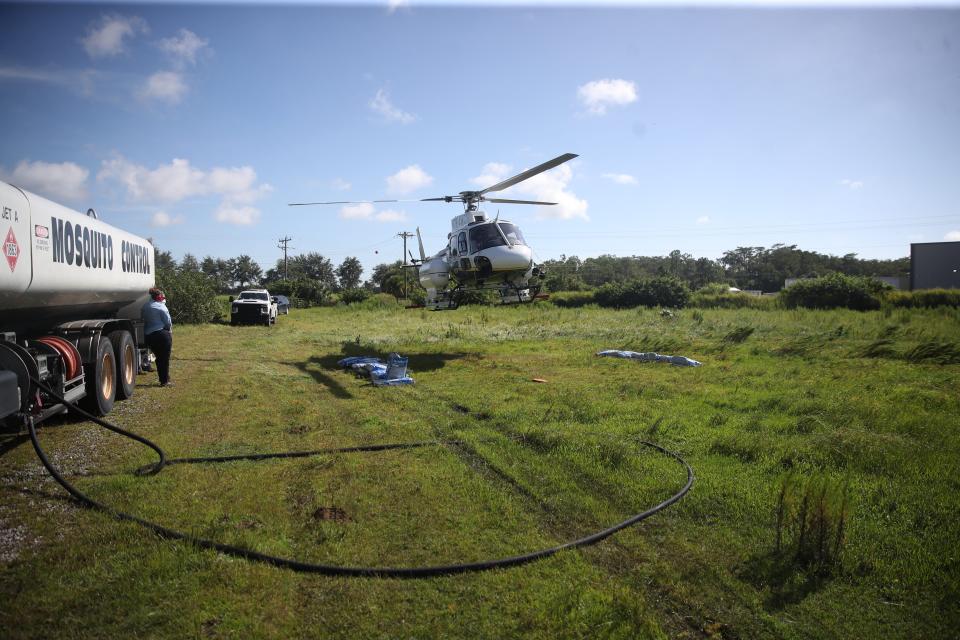'They only feed on us': Experts tracking Aedis, other mosquito populations in wake of Ian
The lingering impacts of deadly Hurricane Ian have left Southwest Florida reeling; but a new menace has emerged this week as disease-carrying mosquitoes are blanketing the region.
With storm surge of more than 15 feet in some areas and more than 1 foot of rain in others, the landscape is soggy and saturated, perfect conditions for spreading West Nile and Dengue fever.
"They're really everywhere, all over," said Eric Jackson, spokesman for the Lee County Mosquito Control District. "We have pilots in the air and we’re going to get every single spot."

Cooler, drier weather was welcome in the wake of Ian, especially for a community buried in trees and construction debris.
But disease-carrying species emerged about a week after Ian made landfall, adding another layer of public safety concern to a region stricken with health challenges.
"We’ve really stepped up the adulticide, and tonight we’ll have planes out to get the county covered to help the people," Jackson said Friday. "And then we’ll focus on larvicide."
Sheriff Marceno: Hurricane Ian deaths drop related to medical examiner's new criteria
First week after Hurricane Ian was pretty clear of mosquito activity
Jackson said the first week after Hurricane Ian was pretty clear of mosquito activity. But, the biting pests have grown tremendously in numbers in just a few days.
"The phone calls have increased with people saying they’re having issues, but thankfully most of the county has power again," Jackson said. "That helps with people being able to close their windows."
Most of the dozens of different types of mosquitoes are just pests, but some freshwater species are capable of transmitting potentially deadly diseases to humans.
"If you’re outside and there are a lot of mosquitoes, cover up and wear repellants, and do what you can do to keep from being bitten," Jackson said.
Robin King, spokeswoman for the Collier Mosquito Control District, said mosquito populations are exploding to the south as well.
"We noticed a pretty significant uptick in the number of mosquitoes inland, so we've had treatments every night since Tuesday," King said. "Thankfully we haven't had rain because that would have created more standing water. And then there's the debris people are putting at the roadside."
In case you missed it in SWFL:
Where to offer time, money, food and other supplies for Hurricane Ian victims
40 people displaced after city shuts down Fort Myers Yacht Basin
What mosquitoes carry the West Nile virus and Dengue fever?
The culex variety of mosquitoes are the ones that carry West Nile virus. Aedis aegypti carry Dengue fever, which has reared its head in Southwest Florida already this year.
"We've only seen one horse with West Nile and nothing in our traps that we use to test for West Nile," King said. "(But Dengue fever) is pretty bad in Cuba right now and we've had a lot of travel cases coming in and out of Miami. And we had one local case confirmed here in August."
This mosquito only lives around humans, "and they only feed on us," King said.
Lee County was earlier this year the driest county in the state, but nearly 4 feet, on average, has fallen across the region during this rainy season, according to South Florida Water Management District records.
Lee and Collier combined, on average, have received about 8 inches of rainfall more than average since mid-May.
Mosquito season coincides mostly with the summer months, although Southwest Florida has mosquitoes during all 12 months of the year.
The biggest thing the public can do to help stem the spread of mosquito-borne illnesses is to empty any containers that are filled with water.
"Make sure the containers are picked up, anything that can hold water," Jackson said.
Other mosquito-borne illnesses, like, chikungunya, and Zika virus outbreaks, have occurred in Florida, Hawaii, Texas, Puerto Rico, the U.S. Virgin Islands and American Samoa, according to the Centers for Disease Control and Prevention.
Connect with this reporter: @ChadEugene on Twitter.
This article originally appeared on Fort Myers News-Press: Hurricane Ian left perfect conditions for virus-carrying mosquitoes

